How to Torrent Safely and Anonymously With a VPN in 2024
Even careful torrenting comes with risks. Without proper protection, torrenting can expose you to malware, DDoS attacks, hackers, and even legal trouble. Moreover, your ISP can see what you’re doing and throttle your speeds.
Fortunately, you can use a VPN to hide your IP address and online activity to stay safe and anonymous while torrenting. After testing 30+ VPNs, I found that ExpressVPN is the safest and fastest VPN for torrenting with reliable P2P servers worldwide.
You can try ExpressVPN risk-free for torrenting. It has TrustedServer technology, military-grade encryption, DNS/IP leak protection, and other security features to keep your torrenting activity safe. Plus, it’s backed by a 30-day money-back guarantee. I verified this policy by requesting a refund over live chat and got my money back in 3 days.
Torrent safely with ExpressVPN
Quick Guide: 3 Easy Steps to Download Torrents Safely With a VPN
- Install a VPN. ExpressVPN is the fastest and most secure option for downloading torrents from anywhere.
- Connect to a VPN server. Be sure to connect to a local server before starting a torrent client to keep your IP address private.
- Launch your torrent client and start downloading. Only use reputable torrent clients like BitTorrent, uTorrent, qBittorrent, or Deluge.
Why You Need a VPN to Torrent Safely and Anonymously
1. Avoid ISP Throttling
Internet service providers (ISPs) can intentionally slow down your internet speed when you’re using torrents and, in certain instances, they may also limit your ability to visit particular websites. This action is driven by ISPs’ attempts to dissuade users from participating in torrenting activities on their networks.
A VPN encrypts your traffic and lets you use an IP from a server in its network. This way, your ISP won’t be able to detect your torrenting activity, and you can enjoy fast and uninterrupted torrenting without worrying about bandwidth throttling.
2. Access Torrent Sites
Torrent sites are blocked in some workplaces, schools, and other establishments where access to content is controlled. Fortunately, a quality VPN can help you bypass these firewalls and access torrent sites from anywhere. This allows you to access blocked torrent sites and download content anonymously and safely.
3. Hide Your IP Address
When you use BitTorrent, your IP address is exposed to other peers on the network. This can put you at risk of being targeted by hackers and copyright trolls who can identify you and track your online activity.
Hackers can scan your IP address for open ports and launch DDoS attacks to disrupt your internet connection or gain access to your personal information. Copyright trolls can collect the IP addresses of users who are downloading copyrighted content and send threatening settlement letters.
A VPN hides your IP address and assigns you a new one. It routes your traffic through a secure server and makes it difficult for anyone to trace your online activity back to you. This means you can torrent anonymously and safely with a VPN without worrying about potential risks.
A Guide to Torrent Safely and Anonymously With a VPN
1. Download a Reputable VPN
A good VPN for torrenting should have robust security features like 256-bit encryption, a kill switch, WebRTC, and DNS leak protection. This will help protect your identity and online activity from hackers and other third parties. Your VPN should also allow torrenting on servers in different locations (always check local laws before using a VPN to torrent).
Some VPNs (like CyberGhost) offer P2P-optimized servers designed for torrenting. These servers provide faster speeds and more reliable connections for downloading or uploading torrents, while keeping you safe and anonymous.
Bonus features like ad trackers and malware blockers will shield you from deceptive ads and keep malware from infecting your device. For example, NordVPN’s Threat Protection and PIA’s MACE protect you from trackers, malware, and intrusive ads, making it a great choice for torrenting.
2. Configure Your VPN
After installing your VPN, head to the settings section to ensure the following security settings are activated:
- The kill switch — This will automatically disconnect you from the internet if your VPN connection drops, preventing any potential leaks of unencrypted data.
- Military-grade encryption — Always choose AES 256-bit encryption as it’s the highest level available, and virtually impossible to crack.
- A secure protocol — Most reputable VPNs have OpenVPN and WireGuard protocols, which are both fast and safe for torrenting. ExpressVPN’s Lightway and NordVPN’s NordLynx are even better. Stay away from older and unsafe protocols like PPTP.
- Leak protection — Turn on both IP and DNS leak protection to prevent your real IP address and DNS requests from being exposed.
- Split tunneling — It lets you use the VPN connection only for certain apps, like torrent clients. This is useful when you need to run your banking apps or streaming services with your regular IP address.
Avoid NAT Firewall and Port Forwarding for Torrenting
While NAT firewalls and port forwarding can be useful for some internet activities, they can interfere with torrenting and potentially compromise your security.
NAT firewalls are built into many home WiFi routers and VPN services to prevent unsolicited internet traffic from reaching your device. While this is a good thing for security, NAT Firewalls can prevent you from connecting to peers when torrenting, resulting in lower download and upload speeds. It can even stop your torrents from downloading.
You can bypass NAT firewalls with port forwarding, but it comes with security risks. It opens up a direct connection to your device, which can expose your IP address. This can increase the risk of malware and viruses, detection by copyright trolls, and your ISP identifying you.
3. Choose a Trusted Torrent Client and Configure Its Settings
Warning! Make sure you only download copyright-free material to stay out of trouble. My team and I do not condone using a VPN for any illegal activities. Always check the rules and regulations of your country before using a VPN to torrent.
A torrent client is a software application that allows you to download and share torrent files. You can’t directly download these files because they’re actually sent in many tiny parts from many different locations. The torrent client manages all of these “bits” and puts them together so you can download the complete file.
When choosing a torrent client, select one that offers encryption and peer-blocking features for safe and secure torrenting. Also, go for a lightweight torrent client that doesn’t take up too much space or put too much load on your device.
Here are some trusted torrent clients to consider:
- Vuze — A powerful and feature-rich torrent client that offers advanced options such as bandwidth management, media playback, and support for magnet links.
- BitTorrent — A lightweight and easy-to-use client that offers fast download speeds and support for RSS feeds and remote access.
- qBittorrent — An open-source and ad-free client that offers a clean and intuitive interface, support for sequential downloading, and built-in search functionality.
- uTorrent — A popular and widely used client that offers fast download speeds, support for multiple torrents, and remote access through a web interface.
- Deluge — A cross-platform and lightweight client that supports plugins, encrypted downloads, and remote access through a web interface.
Configuring Your Torrent Client
First of all, enable IP binding on your torrent client. This allows you to approve connections from specific IP addresses and block all others, preventing data leaks if your VPN connection drops.
You should also consider:
- enabling encryption and limiting bandwidth in your torrent client’s settings
- choosing a port that’s not commonly blocked by ISPs
- using a VPN to ensure maximum privacy
- enabling peer blocklists to protect against malicious peers and copyright trolls
4. Install an Antivirus Software
Torrenting exposes your device to potential malware and viruses. Even if you’re downloading a file from a reputable source, it’s still possible for the file to be infected with malware. Antivirus software can protect against these threats.
Norton and McAfee antivirus software are some of the best on the market. These programs offer real-time scanning, virus removal, and protection against phishing attempts.
The best way to stay protected is to use VPN and antivirus together. Fortunately, some VPNs also provide antivirus protection with their subscriptions, such as:
- CyberGhost: When you subscribe to CyberGhost’s Security Suite, you’ll get a VPN and antivirus software that offers real-time protection, file scanning, website blocking, and parental controls. The antivirus is only available for Windows.
- Private Internet Access: PIA also allows you to add its antivirus software to your VPN subscription. Like CyberGhost Security Suite, PIA’s antivirus is only available for Windows. It offers file scanning, website blocking, and a firewall.
- NordVPN: Has a built-in antivirus feature called Threat Protection that’s free with every NordVPN subscription. It works on Windows and macOS, and guards against intrusive ads and malware.
- Surfshark: With a Surfshark One subscription, you’ll get a VPN, antivirus software, breach alerts, and a search engine. The antivirus offers real-time protection against malware, ransomware, and other threats.
- IPVanish: With every IPVanish subscription, you’ll get its VIPRE antivirus add-on completely free. The antivirus is compatible with Windows and macOS, and offers real-time protection against malware and ransomware, file scanning, website blocking, and parental controls.
5. Choose Safe Torrents
Choosing safe torrents is critical to avoid downloading malicious content or copyrighted material, which can lead to legal troubles. Here are some tips for choosing safe torrents:
- Choose reputable torrent sites: Stick to well-known and established sites. Lesser-known sites may host fake or infected files that can harm your device.
- Choose torrents with more seeders: A higher number of seeders means the file is more widely available and has been downloaded and verified by more users.
- Read comments and reviews: Look for comments and reviews from other users to see if the file is legitimate and safe to download.
- Check the type and size of the file: Check the file type and size to make sure it matches the content you’re looking for. Malicious files may be disguised as legitimate files or may be unusually small in size.
- Use antivirus software: Always use antivirus software to scan the downloaded files for any malware or viruses.
- Do not run .exe files: Avoid downloading .exe files as they may contain malware or viruses that can harm your device. If you accidentally download a .exe file, delete it immediately from your device.
- Avoid copyrighted content: Download torrents from sites like the Internet Archive and Public Domain Torrents to avoid downloading copyrighted content.
The Best VPNs to Torrent Safely (Tested 2024)
1. ExpressVPN — Ultra-Fast Speeds & Best-in-Class Security for Quick & Safe Torrenting
Key Features:
- 3,000+ servers in 105 countries, with unrestricted P2P support on all of its servers
- TrustedServer Technology, a proprietary Lightway protocol, AES 256-bit encryption, leak protection, and more for safe torrenting
- No-logs policy audited by KPMG and Cure53
- Torrent on 8 devices simultaneously
- 30-day money-back guarantee
ExpressVPN is the best VPN for torrenting, thanks to its lightning-fast speeds. On its servers in the US, the UK, Australia, and Japan, I recorded average speeds of 94 Mbps (only 6% slower than my baseline speeds). I downloaded the entire audiobook of The Adventures of Tom Sawyer from The Internet Archive using uTorrent in 47 seconds.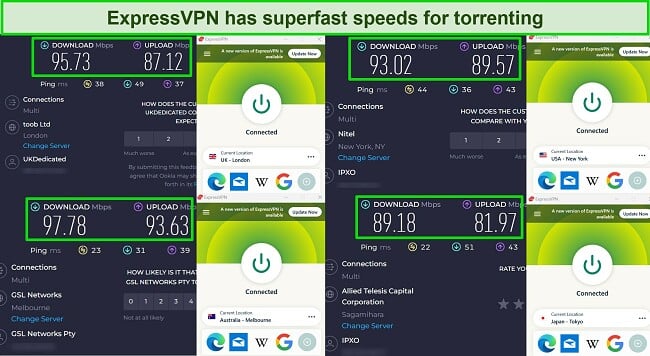
ExpressVPN’s 3,000+ servers across 105 countries support P2P file sharing. This means you can safely torrent from any location without worrying about speed or connection drops. I recommend connecting to the server nearest to your location for the best performance while torrenting.
I found its split-tunneling feature useful for torrenting. This lets you use ExpressVPN for your torrent client while the rest of your apps use your regular internet connection. Split-tunneling is easy to set up on ExpressVPN’s Windows app — I simply added BitTorrent to the list of split-tunneling apps and enabled the feature.
Unfortunately, the split-tunneling feature is only available for Windows, Android, and router apps. But ExpressVPN has an extensive list of other security features to keep you safe while torrenting. These include:
- TrustedServer technology: Uses RAM-only servers, so no data is ever written to a hard drive.
- The proprietary Lightway protocol: Provides strong encryption and faster speeds than OpenVPN and WireGuard.
- “Network Lock” kill switch: Shuts down your internet to prevent accidental IP leaks in the event your VPN connection drops.
- Obfuscated servers: All ExpressVPN servers use obfuscation to disguise your VPN traffic as regular traffic.
- No-logs policy (audited by both KPMG and Cure53): Independent audits confirm that none of your identifying information or browsing activity is ever logged or stored.
- Based in the British Virgin Islands: ExpressVPN isn’t subject to data retention laws, which means that even if law enforcement agencies demand user data, it doesn’t have to oblige.
- AES 256-bit encryption: This ensures that your traffic is routed through an encrypted tunnel, making it impossible for anyone to see that you’re torrenting.
- Leak protection: Prevents your DNS, IPv4, IPv6, and WebRTC data from leaking, so you stay anonymous while torrenting.
To make sure ExpressVPN actually keeps my identity hidden, I ran multiple leak tests on its servers. ExpressVPN never revealed my actual IP and DNS information. I also tried accessing some sites while switching between servers, but its kill switch worked perfectly and stopped my internet altogether as soon as the first server disconnected.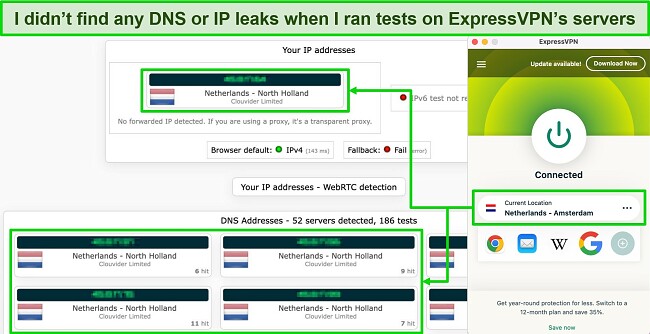
ExpressVPN has user-friendly apps for all major platforms, including Windows, macOS, Linux, iOS, Android, and more. It means you can torrent on your PC or smartphone without any hassle. Plus, ExpressVPN allows 8 devices simultaneously, meaning you can use it for other activities like gaming or streaming while torrenting.
Although it can be tricky, I recommend setting up ExpressVPN on your router and using port forwarding to connect directly to other seeders on the same torrent. This leads to faster downloads and better connections. However, port forwarding can also make you more vulnerable to cyberattacks, so be cautious when enabling this feature.
Its monthly plans are expensive, but you can save 49% on ExpressVPN’s 1-year + 3 months subscription. It will cost you only $6.67/month.
You can try ExpressVPN for torrenting at zero risk — all plans come with a 30-day money-back guarantee. If you’re not happy with the service, you can get a refund. To test this policy, I requested a refund over live chat, and a customer support agent approved my request without asking any questions. I got the money back in 3 days.
ExpressVPN works with: Windows, macOS, Linux, Chromebook, Android, iOS, Chrome, Firefox, Edge, Amazon Fire TV, Amazon Fire TV Stick, Nvidia Shield, Xiaomi Mi Box, Google Chromecast, Roku, Android TVs, smart TVs, routers, and more.
2024 Update! ExpressVPN has dropped prices for a limited time to a crazy $6.67 per month for the 1-year plan + 3 months free (you can save up to 49%)! This is a limited offer so be sure to grab it now before it's gone. See more information on this offer here.
2. CyberGhost — P2P-Optimized Servers for Fast & Secure Torrenting
Key Features:
- 11,676+ servers in 100 countries, with 75+ servers optimized for torrenting
- NoSpy servers, military-grade encryption, an automatic kill switch, and IP/DNS leak protection
- No-logs policy audited by Deloitte
- Allows 7 simultaneous device connections
- 45-day money-back guarantee
CyberGhost has 75+ servers dedicated to torrenting to prevent ISP throttling and guarantee total anonymity. These servers are optimized to give a speedy connection for large data transfers, allowing you to torrent files safely without interruptions.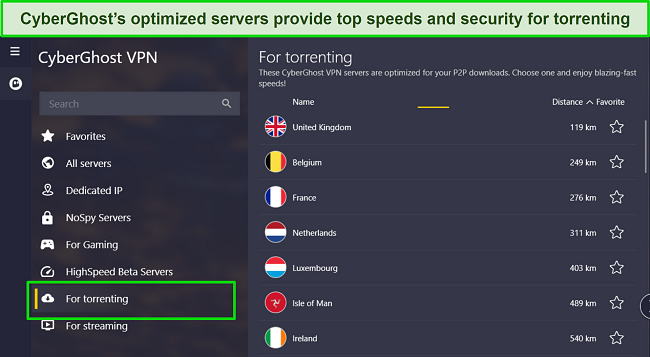
During my tests, I connected to CyberGhost’s torrenting server in London and downloaded a large video file of The Met’s production of La Bohème from Public Domain Torrents. Despite the file size (3.3 GB), it took me only 6 minutes to download, with speeds averaging around 88 Mbps (only a 12% decrease from my baseline speed).
Based in Romania, CyberGhost is outside of the 5/9/14 Eyes alliance, which means it’s not bound by data retention laws or international intelligence-sharing agreements. This is crucial when torrenting, as it protects you from third-party snooping and copyright trolls. It also has plenty of other security features to protect your online activity while torrenting:
- Split tunneling: Control which apps and sites use your VPN connection, so you can torrent anonymously while accessing other sites with your regular IP.
- A kill switch: Automatically disconnects your internet if your VPN connection drops to prevent accidental IP leaks.
IP/DNS leak protection: Keeps your IP and DNS information private, so your online activity is never exposed. - Military-grade encryption: Ensures your traffic is encrypted with the highest level of security, so nobody can see what you’re downloading.
- No-logs audited by Deloitte: Guarantees that CyberGhost doesn’t log any of your personal information or online activity.
- Built-in ad blocker: Blocks intrusive ads and malware on torrenting websites, but isn’t as effective as PIA’s MACE or NordVPN’s Threat Protection.
CyberGhost’s intuitive apps for PCs and smartphones make it easy to use it for torrenting. I opened its Windows app and could easily find P2P servers under the “For downloading” category. You can use CyberGhost’s Smart Rules feature to automatically connect you to a VPN server whenever you open a torrent client.
Unfortunately, CyberGhost’s distant connections weren’t as fast as ExpressVPN’s. When I connected to its Toronto server, I experienced a 33% drop in speed, which is significantly higher than ExpressVPN’s 8% drop. I recommend connecting to nearby servers for the best speeds.
You can get CyberGhost for torrenting for just $2.19/month with its 2-year + 2 months plan. It has a 45-day money-back guarantee, so it’s easy to claim your money back if you’re not satisfied. I tested it for 2 weeks and asked for a refund via live chat. The agent approved my request and I received my money back in 4 days.
CyberGhost works with: Windows, macOS, Linux, Android, iOS, Raspberry Pi, Chrome, Firefox, PlayStation, Xbox, Nintendo Switch, Amazon Fire TV, Amazon Fire TV Stick, Roku, smart TVs, routers, and more.
2024 Update! You can subscribe to CyberGhost for as low as $2.03 per month + get an extra 4 months free with the 2-year plan (save up to 84%)! This is a limited offer so grab it now before it's gone. See more information on this offer here.
3. Private Internet Access (PIA) — Massive Server Network of P2P-Friendly Servers for Seamless Torrenting
Key Features:
- 35,000+ servers in 91 countries, with P2P support on each server
- MACE ad blocker, military-grade encryption, an automatic kill switch, and leak protection
- No-logs policy verified by Deloitte
- Allows unlimited simultaneous device connections
- 30-day money-back guarantee
PIA has 35,000+ servers in 91 countries and every server supports P2P file transfer. This reduces the risk of congestion on its network and supports fast speeds for torrenting. I tried its servers in the US, the UK, Canada, and Japan, and got speeds above 65 Mbps each time — fast enough to download large torrents quickly.
If you want a further speed boost for torrenting, PIA lets you switch to 128-bit encryption. While 256-bit encryption is the safest, 128-bit can give you a speed boost of 5-10%, especially on nearby servers. When I did this, my speeds on its London server went from 67 Mbps to 74 Mbps.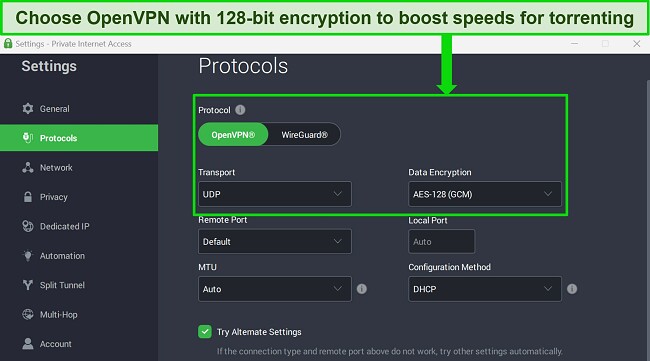
PIA’s MACE ad blocker protects you from potential ad trackers, malware, and phishing attempts while you torrent. During testing, I came across many torrenting websites full of intrusive ads and potential malware. When I turned on PIA’s MACE, over 80% of the ads were gone, and I had a much better browsing experience.
With top-class security features, PIA keeps your entire torrenting activity safe with the following:
- An audited no-logs policy: Deloitte recently validated PIA’s no-logs policy, ensuring your privacy while torrenting.
- A multi-hop feature: Routes your internet traffic through two servers to prevent third-party tracking, but it can slow down your connection speeds.
- DNS/IPv6 leak protection: Keeps your DNS requests and IPv6 addresses private, confirmed in multiple tests.
- Military-grade encryption: Your data can’t be accessed or intercepted by hackers.
Just like ExpressVPN, PIA also allows port forwarding. It opens a direct port on your network so you can directly connect to your peers, allowing for faster downloads. Keep in mind that it also opens your port to potential threats, so use it with caution.
I was initially concerned about my privacy since PIA is based in the US, which has strict data retention laws. However, multiple independent audits have proved that PIA doesn’t store any of your personal or browsing data, so you have nothing to worry about.
PIA has apps for PCs (Windows, macOS, Linux) and smartphones (Android and iPhone), but they aren’t as easy to navigate as ExpressVPN’s apps. There are a lot of customizations on the home screen that are great for advanced users but could overwhelm those new to VPNs. Still, its default settings are fine for torrenting, so you don’t need to change anything.
Prices start at $2.19 per month, which is great value for money. Plus, it comes with a 30-day money-back guarantee, letting you try PIA completely free for torrenting. I tested the refund process by emailing the support team and received a reply approving my request in 7 hours. The fee amount was credited back to my card 4 days later.
PIA works with: Windows, macOS, Linux, Android, iOS, Chrome, Firefox, Opera, PlayStation 4, Xbox One, Amazon Fire TV devices, Chromecast, Apple TV, Roku, smart TVs, routers, and more.
4. NordVPN — SOCKS5 Proxy Servers in 8 Locations for Speedy Torrenting
Key Features:
- 6,300+ servers in 111 countries, with dedicated P2P servers in 50+ countries
- Threat Protection, military-grade encryption, kill switch, and leak protection
- No-logs policy verified by PwC and Deloitte
- Secure 10 devices with one subscription
- 30-day money-back guarantee
NordVPN’s SOCKS5 proxy servers in 8 locations offer fast and private torrent downloads. These servers are compatible with popular torrent clients like uTorrent and BitTorrent. NordVPN even has detailed guides on setting up these proxies on your torrent client, making it easy for you to get started. I set it up on uTorrent in under 10 minutes.
Using NordVPN’s proprietary NordLynx protocol, I got speeds of around 77 Mbps. I downloaded a 3.4 GB copyright-free movie in just 4 minutes. For the best torrent speeds, I recommend using NordLynx or connecting to a proxy server close to your location.
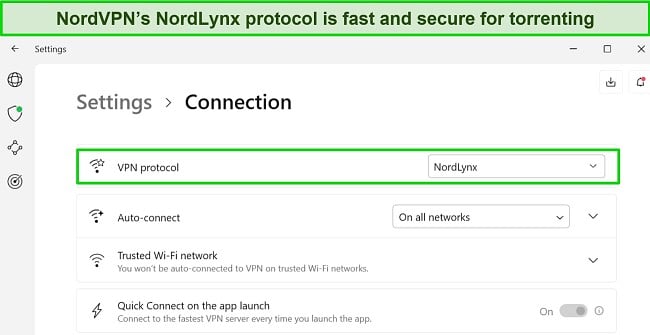
You can count on NordVPN to keep your torrenting activity safe with multiple security features, including:
- Threat Protection: Protects against malware and intrusive ads while torrenting.
- Double VPN: Routes your traffic through two servers, adding an extra layer of encryption to your traffic.
- An automatic kill switch: Cuts your internet connection if your connection drops, preventing any accidental exposure of your torrenting activity.
- A no-logs policy: NordVPN never logs your activity or connection metadata, ensuring your privacy while torrenting. Independent audits by PwC and Deloitte have confirmed this.
- Obfuscated servers: Disguises your VPN traffic as regular HTTPS traffic, making it hard for your ISP to detect and throttle your connection while torrenting.
NordVPN has dedicated P2P servers in 50+ countries that are optimized for torrenting. I tested a few of NordVPN’s dedicated servers, and the average speed was around 72 Mbps. While SOCKS5 proxy servers were faster, the P2P servers were quick and offered encryption.
Unfortunately, I didn’t find NordVPN’s Windows app very friendly. It kept opening every time I turned my PC on, and it took me a while to figure out how to stop it from auto-launching. Still, I didn’t have any trouble finding and connecting to P2P servers nearby.
You can try NordVPN for torrenting free with its 30-day money-back guarantee. Its 2-year plan will cost you $3.39/month, and you can get a full refund if you’re not satisfied. I tested this policy by asking an agent for a refund over live chat. The agent quickly processed my request, and the fee was refunded to my account in 5 days.
NordVPN works with: Windows, macOS, Linux, Chromebook, Android, iOS, Raspberry Pi, Chrome, Firefox, Apple TV, Roku, Amazon Fire TV, Nvidia Shield, Chromecast, Android TVs, routers, and more.
5. Surfshark — Nexus Technology Provides Added Safety for P2P Activity
Key Features:
- 3,200+ servers in 100 countries, all with P2P support
- IP Rotator, IP randomizer, multi-hop, military-grade encryption, kill switch, and leak protection
- No-logs policy independently audited by Deloitte
- Connect unlimited devices at the same time
- 30-day money-back guarantee
Surfshark’s Nexus technology makes torrenting more secure with an IP rotator, IP randomizer, and multi-hop features. The IP rotator and randomizer keep your IP address safe by constantly changing it as you torrent, while multi-hop routes your traffic through 2 or more VPN servers to keep your activity hidden.
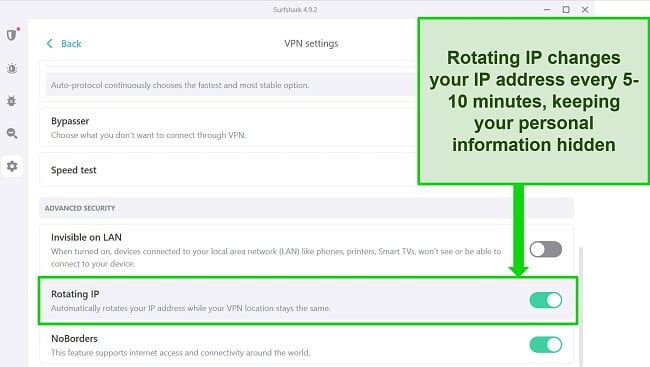
Surfshark has many more security features to ensure your privacy while torrenting, including:
- CleanWeb: Blocks ads, trackers, malware, and phishing attempts to keep you safe while torrenting.
- A kill switch: Automatically disconnects you from the internet if your VPN connection drops.
- No-logs policy: Surfshark has a strict no-logs policy, which means it doesn’t log any of your online activities.
- NoBorders mode: Lets you browse the internet without restrictions.
While its headquarters are in the Netherlands, which is within the 9 Eyes jurisdiction, Surfshark’s no-logs policy has been verified by Deloitte. This means that even if authorities within the jurisdiction request user data, Surfshark has nothing to hand over, ensuring your privacy and anonymity while torrenting.
With 3,200+ servers in 100 countries, Surfshark offers P2P support on all servers. During my tests, I connected to Surfshark’s servers in the US, Canada, and the UK and experienced consistent speeds averaging around 83 Mbps. These speeds are sufficient for fast and reliable torrenting.
Surfshark’s long-distance connections aren’t as fast as ExpressVPN’s, but still provide decent download speeds for torrenting. On its NYC server, my speed dropped by 43%. However, due to my baseline speed being around 100 Mbps, I was still able to download a 2 GB public domain torrent file in about 20 minutes.
Each subscription allows unlimited simultaneous device connections, meaning you can protect all your devices with just 1 account. This is particularly useful for torrenting, as Surfshark can be used on multiple devices to download and share files without any restrictions on bandwidth and speeds.
Surfshark’s 2-year + 3 months plan starts from just $2.19 a month and it has one of the best monthly deals. It’s even backed by a 30-day money-back guarantee, meaning there’s no risk in trying it yourself. Requesting a refund is simple: ask for it via live chat. I received a full refund 4 business days after the agent approved my cancelation.
Surfshark works with: Windows, macOS, Linux, Chromebook, Android, iOS, Raspberry Pi, Chrome, Xbox, Firefox, Amazon Fire TV, Apple TV, Roku, Nvidia Shield, Chromecast, Android TVs, smart TVs, routers, and more.
Comparison Table: 2024’s Best VPNs for Safe Torrenting
| VPN | Avg Speeds | P2P-Friendly Server Locations | Obfuscation | Port Forwarding | Verified No-Logs Policy |
| ExpressVPN | 94 Mbps | 105 countries | ✔
On every server |
✔ | ✔ |
| CyberGhost | 88 Mbps | 75+ countries | ✘ | ✘ | ✔ |
| PIA | 69 Mbps | 91 countries | ✘ | ✔ | ✔ |
| NordVPN | 77 Mbps | 50+ countries | ✔
On 90+ servers |
✘ | ✔ |
| Surfshark | 83 Mbps | 100 countries | ✔
(via Camouflage Mode) |
✘ | ✔ |
Warning! Avoid These VPNs for Torrenting
1. KeepSolid VPN Unlimited
I don’t recommend KeepSolid VPN Unlimited for torrenting because of inconsistent speeds and privacy concerns. It only has 3 servers dedicated to torrenting, which can make downloading even small torrents frustrating and time-consuming.
Plus, VPN Unlimited’s privacy policy is vague, and some user data is stored temporarily. This lack of transparency is concerning if you prioritize privacy and security.
2. Turbo VPN
Turbo VPN doesn’t clearly state whether it supports torrenting or not. However, its customer support confirmed that the premium plan offers access to special servers that allow torrenting. Also, the speeds are usually slow and fluctuate dramatically, even on nearby servers.
I also found Turbo VPN overpriced for what it offers. It lacks advanced features such as anti-malware, stealth servers, and ad blocking, which are essential for secure torrenting.
3. Opera VPN
Opera VPN is a poor choice for torrenting due to its slow speeds. Furthermore, its logging practices and jurisdiction are unclear, making it difficult to trust the service with your data. It doesn’t have a kill switch, so your IP address and online activity could be exposed if the VPN connection drops unexpectedly.
4. TorGuard VPN
TorGuard VPN supports torrenting on BitTorrent, Vuze, uTorrent, and qBittorrent. It is a zero-log service and offers features like a kill switch, leak protection, and SOCKS5 proxy. However, its speeds are so bad that your downloads are likely to stop unexpectedly.
How I Tested and Ranked the Best VPNs for Torrenting
I tested the best VPNs against the following criteria to find out the best ones for torrenting:
- P2P support: All the VPNs in this article have P2P support and offer unlimited bandwidth to download and upload torrents.
- Number of P2P servers: More servers mean better speeds due to less congestion. The VPNs on this list have a substantial number of P2P servers worldwide.
- Security: All the VPNs listed here offer 256-bit encryption, kill switches, and DNS/IP leak protection. Some even have RAM-only servers, IP rotation, obfuscation, and ad and malware blockers, for added security.
- Privacy: All VPNs here have strict no-logs policies that have been independently audited, confirming the authenticity of their claims.
- Speeds: All these VPNs maintain a minimum of 60 Mbps speed (on 100 Mbps base speeds), good enough for fast and uninterrupted downloads of large torrent files.
- Customer support: All the VPNs on this list have 24/7 customer support via email, online support ticket, and live chat.
FAQs on Torrenting Safely and Anonymously in 2024
Is torrenting legal?
It’s complicated. Torrenting public domain content is perfectly legal, and you can torrent in as little as 3 simple steps. If the copyright expires or the material was distributed without copyright, you can download and share the files all you want.
Copyrighted material, which is most of what you’ll find, is illegal to torrent. Depending on where you are, you could find yourself with a jail sentence of 10 years and fines of hundreds of thousands of dollars for downloading or distributing these files. I don’t condone illegal activities, so always torrent responsibly, even when you’re using a VPN.
Can you get caught torrenting if you use a VPN?
Yes and no. While the VPNs on this list mask your IP address and make it virtually impossible for copyright trolls and authorities to track you down, some VPNs might compromise your security. If the VPN doesn’t have leak protection, your real IP address and activity can be exposed.
Some countries have stricter laws and enforcement against copyright infringement, so the risk may vary depending on your location. Also, using a VPN does not excuse you from breaking the law. To avoid facing legal issues, always download copyright-free files and use a reputable VPN with a no-logs policy. This will protect your online privacy and offer anonymity in case of accidental clicks.
Is torrenting with a VPN safe?
Yes, torrenting with a VPN is safe and highly recommended. A good VPN will encrypt your internet traffic, making it impossible for anyone to see what you are downloading or uploading. It will also hide your IP address, keep you anonymous and protect you from copyright trolls and other threats.
Make sure your VPN has the following security features:
- A strict no-logs policy to ensure that your online activities are not monitored or recorded by the VPN provider.
- A kill switch to protect your IP address and online activity in case the VPN connection drops unexpectedly.
- DNS and IPv6 leak protection to prevent your online activities from being exposed to your ISP or other third parties.
- Military-grade encryption keeps your data secure while in transit, preventing interception and snooping by third parties.
Bonus features:
- Obfuscated servers to hide your VPN traffic and bypass VPN blocking.
- A multi-hop feature to route your internet traffic through multiple VPN servers for added security and privacy.
- An ad and malware blocker to protect against malicious ads and software that could harm your device or compromise your privacy.
Do I need to hide my IP address when torrenting?
A VPN can help you hide your IP address by routing your internet traffic through an encrypted tunnel and replacing your real IP address with a virtual one. This makes it difficult for anyone to trace your online activities back to you. It also prevents your ISP from throttling your speeds and limiting your bandwidth when they detect torrenting.
How does P2P file-sharing work?
P2P file-sharing is a way of distributing data by connecting to a network of users instead of a central server. You should always use a quality VPN with P2P support since torrenting involves downloading and uploading files directly to and from each other’s computers. This can expose you to malware, copyright trolls, and phishing attempts.
When you download a file using P2P file-sharing, your computer connects to the network and downloads small pieces of the file from other users who have already downloaded it. Once you’ve downloaded all the pieces, the P2P software assembles them into a complete file. This process is also called torrenting.
Can I use a free VPN to torrent safely?
No, it’s not safe to torrent with a free VPN. Only a VPN with strong security features (which free VPNs lack) can keep you safe and anonymous while torrenting. I tested many free VPNs and most of them don’t have P2P support on their servers, meaning they won’t allow torrenting.
What’s more, free VPNs usually have very limited security features, which means they aren’t as safe as premium VPNs. Some free VPNs even host intrusive and malicious ads, which can infect your device and cost you a lot more than paying for a VPN subscription. They can even track and sell user data for profit, which completely defeats the purpose of using a VPN for privacy.
Even the best free VPNs come with a limited number of servers and bandwidth, which can cause slow download speeds and interruptions. Because of this, I recommend sticking to a top torrenting VPN, like those listed in this article.
Start Torrenting Safely and Anonymously With a VPN
Torrenting exposes you to a host of online threats. From accidental copyright infringement and legal repercussions to malicious downloads and intrusive ads, there are numerous threats to your privacy and security.
A VPN can help you torrent safely and anonymously by encrypting your internet traffic, masking your IP address, and preventing ISP throttling. ExpressVPN is the fastest and most secure VPN for torrenting, with features like TrustedServer technology, leak protection, Network Lock kill switch, military-grade encryption, and more.
The best part is you can try ExpressVPN for torrenting at zero risk to you. It has a reliable 30-days money-back guarantee, meaning you can get your money back if you’re not satisfied. To test if the policy works, I requested a refund via live chat and received the money back within 3 days.

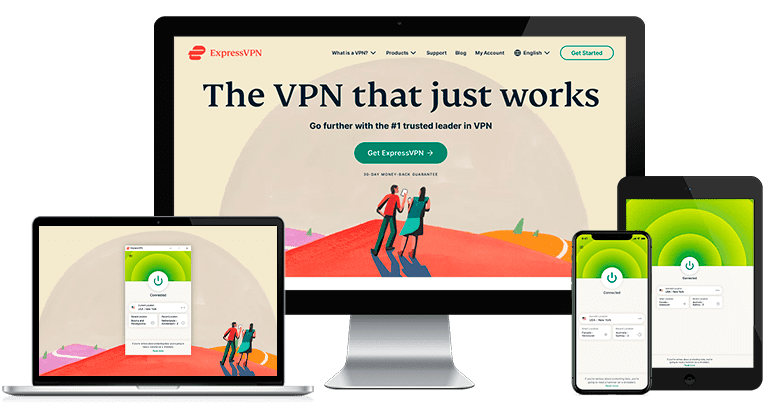
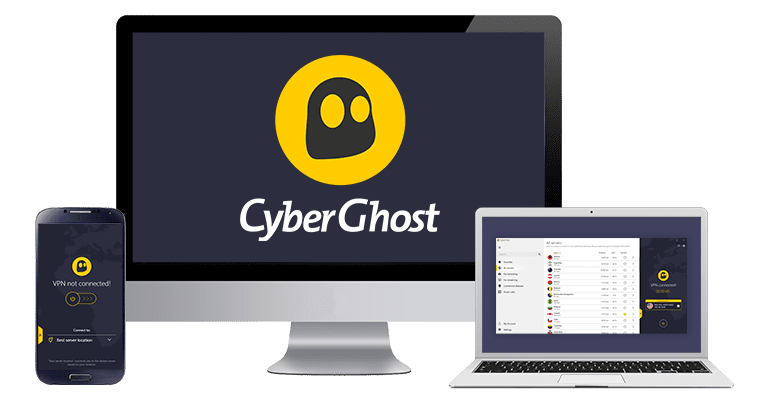
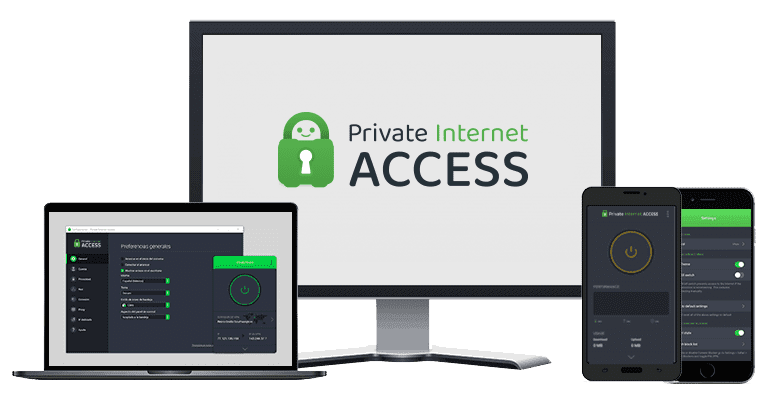

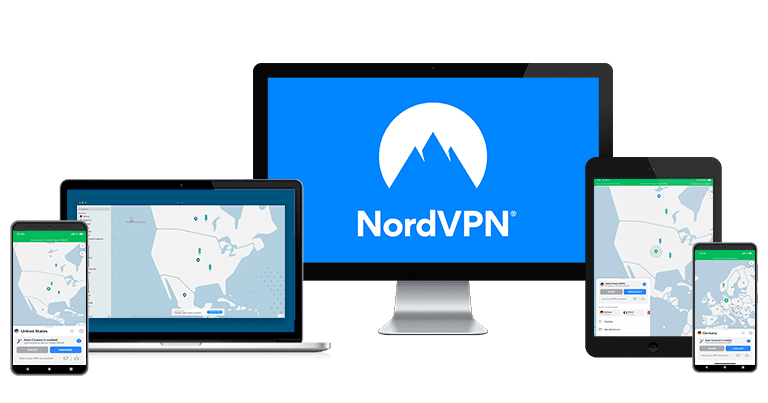

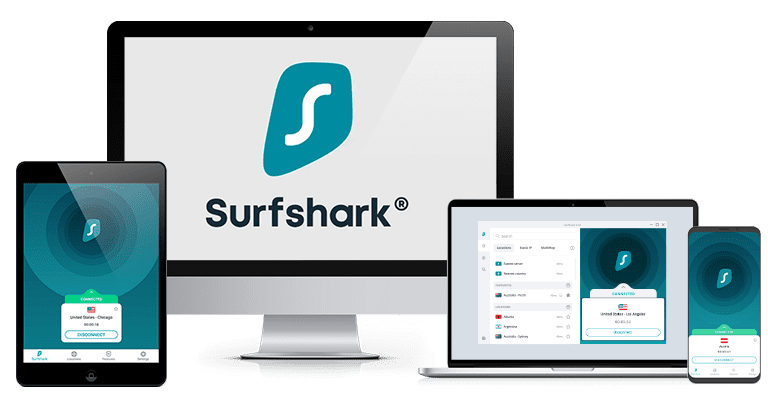
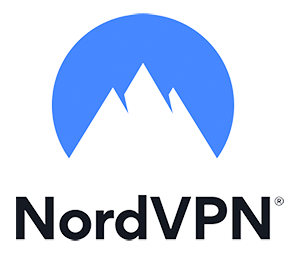




Leave a Comment
Cancel